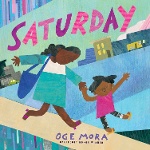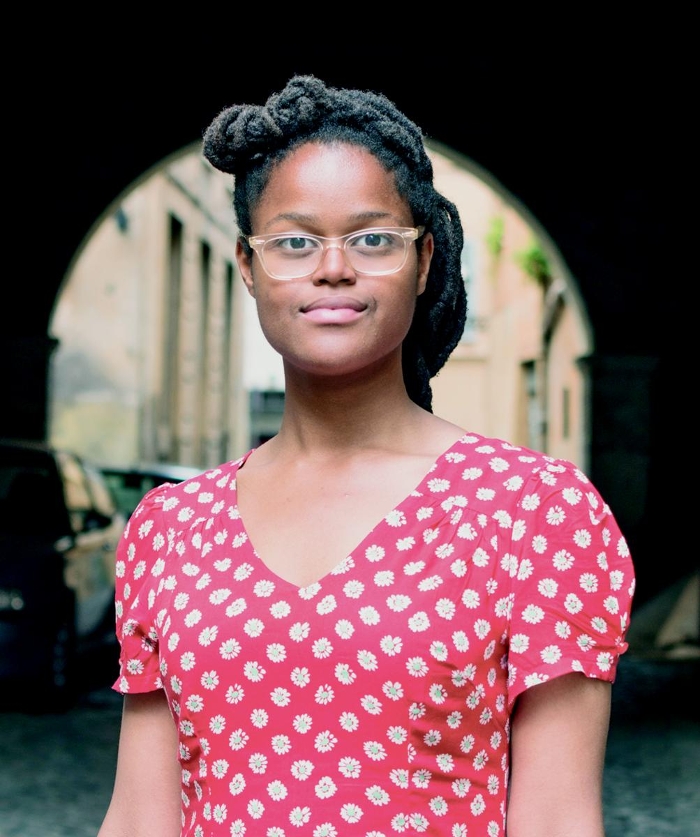Saturday: Oge Mora's 2020 BGHB Picture Book Award Speech
As I worked on Saturday, it was important to me that every visual decision embodied joy. Throughout the book, there is a steady stream of fluorescent pinks, bold yellows, and electric blues. I designed each page with broad diagonal lines in mind in the hope that they would feel dynamic and full of motion. I often stood up in my studio to reenact Ava’s and her mother’s poses in the book because I wanted them to feel like they were dancing along the pages.
 As I worked on Saturday, it was important to me that every visual decision embodied joy. Throughout the book, there is a steady stream of fluorescent pinks, bold yellows, and electric blues. I designed each page with broad diagonal lines in mind in the hope that they would feel dynamic and full of motion. I often stood up in my studio to reenact Ava’s and her mother’s poses in the book because I wanted them to feel like they were dancing along the pages.
As I worked on Saturday, it was important to me that every visual decision embodied joy. Throughout the book, there is a steady stream of fluorescent pinks, bold yellows, and electric blues. I designed each page with broad diagonal lines in mind in the hope that they would feel dynamic and full of motion. I often stood up in my studio to reenact Ava’s and her mother’s poses in the book because I wanted them to feel like they were dancing along the pages.
Not only did I want joy to radiate from every page, I wanted the reading experience to be cheerful as well. I hid flamingos throughout the book, hoping readers would eagerly search for them. I wanted the page where Ava and her mom are drenched in water to make readers laugh. I hoped young listeners would delight in the word zoom and gasp once they realized the puppet-show tickets were sitting back home on the table all along. I wanted it to be a book a librarian would like reading to a class (one of my favorite things as a kid), with places for students to join in and participate. If I had any specific hope for this book, it was that it would make children smile.
Yes, Saturday has a bright and playful aesthetic, but Ava and her mother aren’t always smiling. Throughout the book they experience setbacks. Their Saturday routine gets thrown off balance as storytime is cancelled, their hairdos get ruined, and their peaceful picnic ends up being a noisy one. Ava, like many kids her age, is greatly disappointed as every plan goes wrong. But her mom reminds her with a cheerful refrain that “Today will be special. Today will be splendid. Today is SATURDAY!” So, emboldened, Ava and her mother trek on.
But Ava is not the only one who gets discouraged. When Ava’s mother realizes she forgot the tickets for the one-night-only puppet show, she crumples. While their earlier setbacks were out of their control, here Ava’s mother has made the mistake. Ava’s mother, like my mom had, like so many working moms today, deals with a lot of guilt. She isn’t able to see Ava most of the week, and so she tries to make Saturdays extra special. The cheerful refrain she repeats throughout the story is her promise to Ava, and in this moment she realizes it is a promise she can’t keep. Crestfallen, she declares, “I ruined Saturday.”
Ava’s mother fears that Ava hasn’t enjoyed herself, but Ava tells her, “Today was special. Today was splendid. Saturdays are wonderful…because I spend them with you.” When Ava says these words, the book, like many of the vignettes throughout, comes full circle. On the page where Ava and her mother rush out the door to start their day, Mom leads the way. But here at the end, it is Ava who slowly guides her mother home.
[Read Horn Book reviews of the 2020 BGHB Picture Book winners.]
When I spoke to Roger to accept the Boston Globe–Horn Book Picture Book Award for 2020, he characterized my books as “cheerful.” Most of the time I take cheerfulness as a compliment. But sometimes I worry “cheerful” means my books paint an unrealistic portrait of the world, that they are all aesthetic and no substance, that they aren’t the stories that children need today, especially in the year 2020.
But if there is anything quarantine has given me, it is time to think. And as I have thought about cheerfulness, about joy, I have realized why it is woven into my work. Growing up, I discovered that there was a willing appetite in literature for Black trauma. But when I think of my Black childhood, I would never use trauma or struggle as the summary of my experience. While I have endured racism, misogynoir, and pain in my life, it isn’t who I am. And I don’t want that to be the narrative written for Black children today. I spent too much time in my life ashamed of my Black womanhood—now I defiantly delight in it. My journey as an artist has led me to the belief that my Blackness is not a burden, it is not a barrier, but instead, as Toni Morrison once said, it is “a rich place to write from.” I once as a child thought I was broken. I was once convinced I was unworthy of love. But if there is anything that writing, anything that reading, anything that collage, anything that my mother has taught me, it is deep, enduring love for the weathered corners, uneven edges, and torn ends that make me who I am.
As Ava and her mother dance along these pages, they experience obstacles, but struggle is not their song. As they cheer throughout the book, they sing their joy, their inherent worthiness to the world. Collaged on the page, Ava and her mother live a vibrant, richly layered life, as Black people in the real world do.
I think there is a story written on every one of our hearts, the real cornerstone of everything that we are and everything we want to communicate. In many ways, my book Saturday is that story for me.
On every page, I see the bits and pieces of my life glued down and arranged. Every time I see “MLK” above the library doors, I think of my neighborhood library where all the librarians have known me since I was a baby. When I see the “SISTERS” sign inside the salon, I’m reminded of the nearby salon where my sisters got their hair done. When I look at the busy park scene, I think about the evenings I spent drawing at my local park, with cookouts, drummers, and joggers running past, or the weekends feeding ducks with my dad. I actually had a bus drench me completely in dirty street water as I walked home from school, and there has been many, many, many a time I’ve dashed after a fleeing COTA bus. And most important to this book, I see my mom, who worked seven days a week when I was a child.
But I’m not Ava. And her mother isn’t my mom. Her neighborhood isn’t my neighborhood, and her home and street aren’t mine, either. If I have any hope for how someone will read this book, rather than seeing or even looking for my childhood, I hope you see your own. I hope you will see your kids, your mother, your students, your families, your communities. I hope it might inspire you to write. I hope it might inspire you to try collage. I hope it may remind you of the story written on your own heart, and more than anything, I hope it will inspire you to share that story with the world.
 In an early Saturday manuscript, when Ava and her mother reach the library, they find it closed. When I was revising this story, I decided to change it because I thought no one would believe the library would just be randomly closed on a Saturday. But here we are in 2020, with libraries closed all around the country. Teachers and students are going into poorly ventilated classrooms. Parents are juggling stressful jobs with kids at home. There are plans we’ve had for weeks, months, years; birthdays, graduations, weddings, and, yes, award ceremonies that have had to be either canceled or postponed, with no new date in sight. And Black people, amidst everything, have had to leave our homes to proclaim in the streets that we have the right to live. We are all Ava and her mother, watching our expectations of the world crumble, as we face a global pandemic, a divided government, and widespread racial unrest.
In an early Saturday manuscript, when Ava and her mother reach the library, they find it closed. When I was revising this story, I decided to change it because I thought no one would believe the library would just be randomly closed on a Saturday. But here we are in 2020, with libraries closed all around the country. Teachers and students are going into poorly ventilated classrooms. Parents are juggling stressful jobs with kids at home. There are plans we’ve had for weeks, months, years; birthdays, graduations, weddings, and, yes, award ceremonies that have had to be either canceled or postponed, with no new date in sight. And Black people, amidst everything, have had to leave our homes to proclaim in the streets that we have the right to live. We are all Ava and her mother, watching our expectations of the world crumble, as we face a global pandemic, a divided government, and widespread racial unrest.
I know I am not alone in saying this year has been a year of stress, hopelessness, anger, and deep pain. So if Saturday has made you smile, has resonated with you, has given you comfort, laughter, peace, and, yes, cheer, I am very honored to hear that. If it has reminded you of a cherished loved one, I am honored to hear that, too. That you’ve found some room in your heart for this book is what has kept me cheerful in these difficult times.
It was a bumpy road to get to this book. There were many sleepless nights and days when I couldn’t decide whether I wanted to yell in frustration or cry. And so I’d like to thank the people who saw me through. I would like to first thank Andrea Spooner, my editor; Sasha Illingworth, my art director; my agent, Steve Malk; and Victoria Stapleton and the entire LBYR team. Thank you for believing in me and for believing in this book. I’d also like to thank my sister Chika for reading my many manuscripts, my family for always supporting me, and my mom for, well, everything. And of course I want to especially thank the award selection committee and the Horn Book community for choosing Saturday for this prestigious honor. I worried day and night as I made this book that no one was going to like it. The day I listened to the voicemail from my editor telling me that I had received this award, my eyes welled with happy tears.
What a beautiful day.
From the January/February 2021 issue of The Horn Book Magazine. For more on the 2020 Boston Globe–Horn Book Awards, click on the tag BGHB20. Read more from The Horn Book by and about Oge Mora.

RELATED
ALREADY A SUBSCRIBER? LOG IN
We are currently offering this content for free. Sign up now to activate your personal profile, where you can save articles for future viewing.







Add Comment :-
Be the first reader to comment.
Comment Policy:
Comment should not be empty !!!